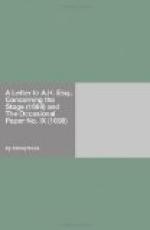Whether the Allowance of
a Theatre in a Christian Country, is
consisting with the Christian
Religion.
The Answer to this Question may be this:
That whatever is approved
by lawful Authority, and is not against
any positive revealed Law
of God, is consisting with the Christian
Religion.
Now it lies upon the Adversaries of the Stage to prove, That the Theatre is against Law or Scripture.
’Tis unfair to take the advantage of the present Corruptions, and cry down the Stage, because Men make an ill use of it. The Priests Won’t allow this Argument in another Case; and I think an ill Poet is no more an Objection against the Stage, than a Clergyman’s being a Blockhead, is to the Pulpit. ’Tis our Misfortune to have too many in both Vocations; tho’, as bad as the Stage is, I don’t doubt but the World has receiv’d a great many Advantaged from it. I shall name you some, and the first may be the reclaiming the Manners of the Clergy.
’Tis certain, since the Stage has used the Gown freely, and the Laity have not been afraid to look into their Faults, that they are more humble, and less publickly vicious: They know if Tom D’urfey can light upon a frail Priest, he won’t scruple to expose his Infirmities, tho’ he is not the only Whipping Tom of the Stage; if they had not others to fear, they wou’d soon grow too many for him. I believe they wou’d be angry, if they thought the People gave the Honour of their Reformation to the Stage; tho’ you can’t believe otherwise, if you consider the difference of the former and present Clergy, what a strange alteration there is where the Knowledge of Plays have come (I wou’d be understood only of those who needed a Reformation) There are now, and have always been, Men among them able and fit to give Laws, and from whom the World was glad to receive them, who appear’d as burning and shining Lights in their Generation; and it was from them we learnt the difference; it was their Light which expos’d the other, and the Stage only took their evil Deeds, to shew them truly the Evils of them. But besides their Reforming of Manners, the Stage has taught them to speak English, and preach more like Ambassadors of their great Master. It has taught them to argue rationally, and at once mended their Stile, and Form of their Sermons. How did Religion labour under heavy Language, and how many People rather absented the Church, than come




